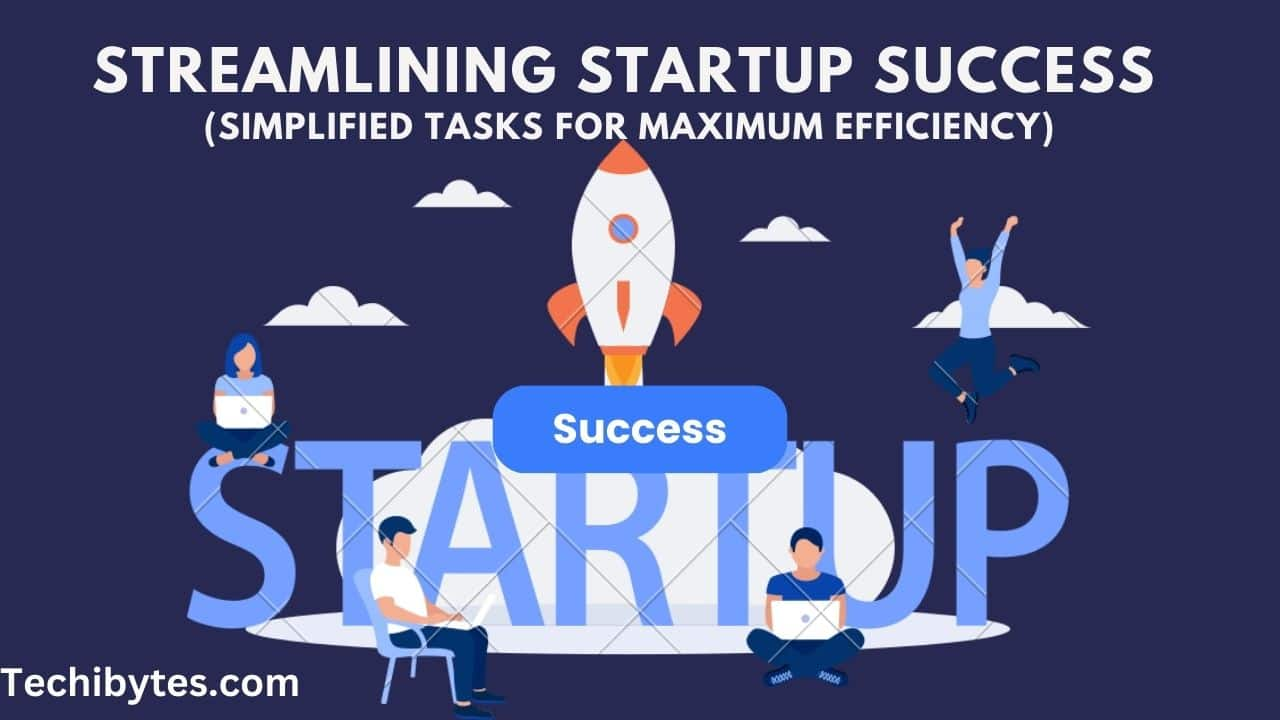In the competitive world of startups, efficiency is truly the key to success. From managing your daily tasks to planning your long-term strategy, every step towards simplifying and streamlining operations can be a significant game-changer. In essence, creating a system that allows for maximum efficiency is what sets the successful ventures apart from those who struggle.
The question you’re bound to have is simple – where do you start? This guide provides a comprehensive overview of simplified tasks entrepreneurs can optimize in their operations to enhance efficiency and consequently drive their businesses to new heights.
Each of these tasks addresses a specific area of startup operations while offering practical solutions which are quick and easy to implement.
Streamlining Startup Success
1. Effective Goal Setting
In the startup world, setting clear, achievable goals can be likened to creating a roadmap for your entrepreneurial journey. These goals provide a clear and cohesive direction for your startup, making sure your team members remain focused, motivated, and work together towards a shared vision.
You can start things off by utilizing the SMART framework (specific, measurable, achievable, relevant, and time-bound). This will ensure your goals aren’t just fanciful dreams but realistic targets that can be achieved within a reasonable timeframe. Implementing this framework from the offset is what will set your company on a clear path to success. Just make sure any goals you set are clearly communicated across the team.
2. Streamlining Communication
The importance of streamlined communication within a startup can never be overstated. The absence of clear, effective communication can cause all sorts of issues, like overlapping tasks, loss of crucial data, and a resultant drop in overall productivity.
The good news is there are lots of ways to enhance communication. This starts by investing in communication tools like Microsoft Teams or Slack. Such tools can simplify collaboration, task tracking, and make it easier for employees to stay on top of their responsibilities. You must hold regular team meetings too.
These should be held to align everyone with the company’s objectives and ongoing projects. Meetings serve as a chance to address any problems, identify potential roadblocks, as well as celebrate achievements. Make sure all attendees have an opportunity to have their say and ensure you take other people’s viewpoints and opinions on board.
3. Managing Your Files
If you have a cluttered workspace, both in a physical and digital sense, this can greatly hamper productivity. In the digital context, this refers to your files. Having a clear, consistent, and easy-to-understand system for naming and storing your files is critical.
Taking this step means you can quickly locate what you need while boosting efficiency in the process. Large files can eat up your storage space and significantly slow down your computer’s operation.
This is where PDF compressor tools come into the equation. Smallpdf have a PDF compressor tool that can drastically reduce the size of your files without worrying about any compromise on quality. You can also use their merge PDF tool to create a single document.
4. Effective Task Delegation
Effective task delegation is a core component of any startup’s success. Without it, tasks can quickly become confusing, and overlapping, not to mention lead to significant productivity losses. To stop these issues from becoming a reality, it’s wise to make use of project management tools like Asana or Basecamp.
Either tool can greatly simplify the process of task delegation, allowing you to clearly assign tasks, monitor their progress, and make sure deadlines are met and clients stay happy.
The secret to effective task delegation lies not just in assigning tasks but in doing so based on individual team member’s skills and interests. This makes sure tasks aren’t only executed efficiently but are of the highest quality. To put it simply, effective task delegation can empower your
employees, boost morale, and lead to higher job satisfaction.
5. Perform Regular Performance Reviews
Regular performance reviews are essential for identifying strengths and weaknesses within your team. These reviews are an excellent opportunity to adjust roles, provide more training and support, as well as rewarding high performers.
The feedback loop created through these reviews can drastically boost your team’s overall productivity. Performance reviews are designed to provide constructive feedback, which encourages personal growth.
When team members understand their performance standards and areas they need to improve on, they’re far more likely to be satisfied with their job and stay with your company longer, meaning your staff turnover won’t be as high.
6. Build a Strong Company Culture
A strong company culture can be a significant factor in determining a startup’s success. It directly affects employee satisfaction, retention, and overall productivity.
A culture that promotes creativity, collaboration, and transparency is likely to foster a dynamic, engaged team. What’s more, providing employee perks and benefits can do wonders for boosting productivity levels and morale.
This could range from flexible working hours to regular team outings. When you develop a strong company culture, you should have no trouble attracting the best talent to your team. Having an army of high-performing employees is what will keep your startup on top.
7. Prioritize Customer Feedback
Your customers are arguably the most important part of your startup. After all, without them, you’ll have a hard time making your venture a success. You need to understand their needs and preferences. Doing so can significantly improve what products or services you offer.
Tools like customer interviews, surveys, or social media listening can be extremely effective in gathering this valuable feedback. A satisfied customer is your best advocate. When they’re happy with your service and have a positive experience, there’s a good chance they’ll recommend your products or services to friends and family.
The great thing is this provides you with free, trustworthy advertising! Prioritizing customer feedback and using it as a tool for continuous improvement is quite simply a no-brainer.
8. Embrace Automation
Automation can dramatically increase efficiency by taking care of mundane, repetitive tasks. Whether it’s customer service, email marketing, or data entry, there are all kinds of automation tools you can implement in your operation that can save precious time.
When you start to embrace automation and work with technology, this can go a long way in reducing the risk of human error. You’ll find automation can drastically elevate your quality of work too. It’s important you strike the right balance between automation and a personal touch, especially
in areas where direct human interaction adds value.
9. Foster Continuous Learning
In the fast-paced world of startups, the business landscape constantly evolves and shows no signs of slowing down. With that said, it’s essential to foster a culture of continuous learning within your team.
Encourage employees to stay updated with industry trends through online courses, workshops, or relevant publications. Continuous learning will not only enhance skill sets but foster a culture of innovation and creativity.
A team that’s continuously learning and growing will always stay ahead of the curve and contribute enormously to your startup’s success.
Streamlining and simplifying tasks are fundamental to improving your startup’s efficiency. By adopting any of our strategies above, you can ensure a thriving work environment that’s primed for success.
Implementing these tips today into your operation will soon see your startup evolve and excel in the challenging, competitive business world.
If you liked this article, then please subscribe to our YouTube Channel for videos. You can also find us on Twitter and Facebook.










